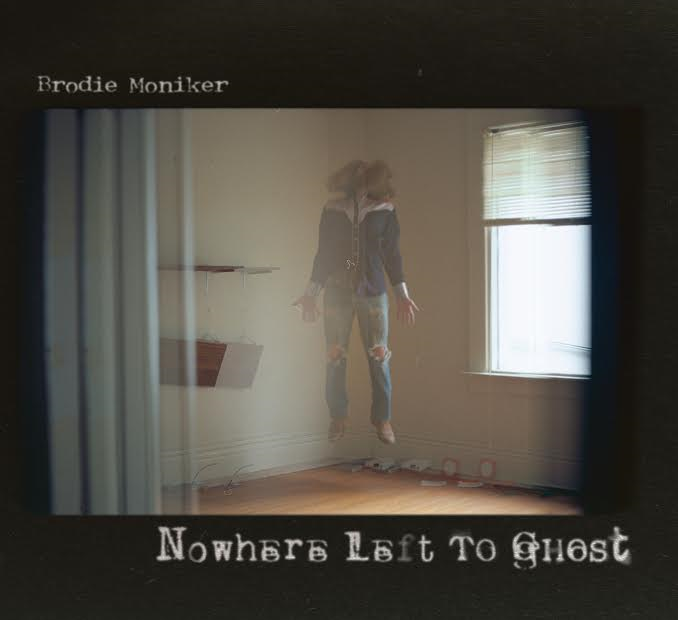Today Brodie Moniker releases his new album, “Nowhere Left to Ghost” – the product of over fifteen years of active music-making in the Saskatchewan music scene. This wonderful, eclectic album clearly displays the fruits of Brodie’s experience – from the slow-burning, slightly spacey opening track “Old Sandbox,” to the crunching guitars of “No Better Place to Be,” to the bluesy “Punching Bag,” the project is delightfully eclectic without feeling disconnected or disjointed.
Brodie was kind enough to spend some time answering Team GDW’s questions about his new project.
You’ve been active as a musician, producer, and engineer for some fifteen years now… what prompted you to release a solo album at this point in your career?
I’d say its always been in the works, I suppose. I played for many years in an avant garde, theatrical rock band called Brain Sauce that I was the main writer and front man for. Some of the songs (Patience, Lying in the Ground) would have come out of that project, while others (Old Sandbox) came from work I did as a teenager working with a recording computer for the first time. The hard drives crashed and I lost most of that work. A few years ago I recovered the data and finished a few things. One of my more experimental songs called, “IS” came from that time too, which is on bandcamp, if anyones curious. Still others came more recently after I got some perspective on a few things and kind of fit in to timeline of songwriting so I included them as well (Punching Bag and Even Birds Return)
It was also a feeling of wanting to be in control of my musical trajectory more. I really enjoy playing music with other people, but definitely have a lot of ideas and vision, so rather than start different bands to do different styles I thought a solo moniker would be more appropriate.

As a classical music geek – and particularly a fan of British composers – I have to say that Percy Grainger references in pop/rock bios are few and far between… but there it is in your bio. ☺ Do you have a classical background? If so, how has it influenced your musicianship?
I began playing alto sax in school band when I was young and use some classical repertoire when I teach guitar students, so that would be a slight classical background I suppose. I enjoy all techniques and styles, so classical fingerstyle has always appealed to me for its diversity and dynamics. When I play without a rhythm section I use a classical guitar with looping, and I beat the thing like a drum a lot. I do think that if I took a lesson from Andres Segovia though, he’d probably still kick me out as I’m not as disciplined as a dedicated classical musician to the genre.
I do also work with many Regina Symphony Orchestra players as well, Steve Leidal who plays bass on the record being one of them. As far as Percy Grainger I think I’m drawn to his fearlessness when it comest to creating music machines as well as compositions and ideas like Free Music. Not unlike that of Harry Partch as well. Today I was watching a performance played solely on instruments made of ice!
I think I’m really inspired by people that go outside traditions and create new systems for music, John Zorn and Coltrane also come to mind. I also really enjoy the work of Frank Zappa and Tom Waits, even though in some ways they are very opposite I think the idea that anything from a bike to an armoire can be an instrument is pretty great.
Terrific guitar playing is a constant thread throughout the songs on your record, but the music crosses several genres; “Patience” has a very late-1960s prog-rock feel to it (and the trumpet is a great touch), while “Punching Bag” is a great blues tune that starts slow and builds up gradually. Does “Nowhere Left to Ghost” pretty accurately capture your own musical tastes, or were you pushed in some new directions on this project?
Wow! Thank you! The trumpet player was named Kris Heidt. I remember working with him on other songs, and showing him the line I was thinking, I kept searching for a note on the fretboard, going higher and higher, until I had no more frets to give, he was right there, in the stratosphere hitting the notes on his horn, no problem. Such a great player, that was a fun session.
I’d say its a good synopsis of where I’m at with this arrangement of musicians. These songs were performed as a trio for the most part for a year or so before recording, so that influenced the quality of the sound. I definitely have played and will delve into more styles and genres in the future. In the past I’ve performed with everything from indie rock (PandaCorn) to folk (Megan Nash), funk and jazz (Von Vulture) and country (Tex Emery). I’m also really drawn to electronic music and sampling as well as heavier music and ambient noise, so I’m hoping to branch out further in the future.
Overall the sound on this album came very naturally. I was definitely pushed and inspired quite a bit by Orion Paradis’ great mixing. He has a wonderful creative ear that compliments the sound we were getting as a band really well! That sound, I would say overall – it’s more a reflection of what I grew up with. Classic and progressive rock and jam band music definitely were something I was into when I wrote some of these songs and really work well with this particular trio. Bands like King Crimson, Genesis, Pink Floyd, Primus, and Parliament Funkadelic were a big part of music for Drake Mark’s (drums), Steve’s (bass) and my time growing up.
I’m always curious about how an artist decides which song should be the first single release – in your case, you chose “Push Play DJ,” which is a great, up-tempo song with a terrific crunchy guitar sound. Was that an easy choice or something over which you agonized a bit?
I’m glad you liked it! Well, I think I picked it because of a few reasons. It grabs your attention for one. It’s also a little tongue in cheek nod to the current state of the music industry from my point of view, so I thought the idea of it being a single was maybe a little ironic. Add to that the big rock production and I guess you could call it a bit of an inside joke with myself.
“Even Birds Return” closes the album in a quieter, more reflective way. “I wish I made more time for love / instead of always thinking of / the ways it kept me on the ground” is a really striking lyric, especially within the context of the metaphor of birds migrating and returning. Would you be willing to expand on that idea a bit?
Sometimes lyrics come out and commit themselves to the form before I even analyze their meaning. Then after signing them enough it just feels like the right thing. This is one of those cases. Ummm, I’m glad you picked it out for that reason. I would say it’s referring to an idealistic version of love that you can always struggle to obtain, or find, versus seeing what love is around you and embracing that, I think might be an easy way to explain it.
You have some live shows scheduled in conjunction with this album’s release, I think – do you have touring plans after that?
I have Winnipeg on the 23rd of March and Regina/Moose Jaw on the 24th and 25th. Once I get my head and heart around the crazy carbon footprint involved in touring across Canada, I’m going to be booking more dates in the late fall.
~ L
Photo credit: Jeff Sawatsky
Album cover credit: Jeremy Sax
Visit Brodie Moniker’s website.


